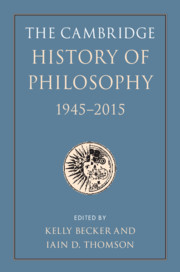Book contents
- The Cambridge History of Philosophy, 1945–2015
- The Cambridge History of Philosophy, 1945–2015
- Copyright page
- Contents
- Contributors
- Preface and Acknowledgments
- Introduction
- Part I Analytic Philosophy
- Part II Continental Philosophy
- Section Five Central Movements and Issues
- 26 Existentialism
- 27 Sartre and Merleau-Ponty on Freedom
- 28 Heidegger, Critical Theory, and the Critique of Technology
- 29 Authenticity and Social Critique
- 30 Hermeneutics in Post-War Continental European Philosophy
- 31 Feminist Philosophy since 1945
- 32 Philosophies of Difference
- Section Six Continental Moral, Social, and Political Philosophy
- Section Seven Continental Aesthetics and Philosophy of Religion
- Part III Bridge Builders, Border Crossers, Synthesizers, and Comparative Philosophy
- Part IV Epilogue: On the Philosophy of the History of Philosophy
- References
- Index
28 - Heidegger, Critical Theory, and the Critique of Technology
from Section Five - Central Movements and Issues
Published online by Cambridge University Press: 08 November 2019
- The Cambridge History of Philosophy, 1945–2015
- The Cambridge History of Philosophy, 1945–2015
- Copyright page
- Contents
- Contributors
- Preface and Acknowledgments
- Introduction
- Part I Analytic Philosophy
- Part II Continental Philosophy
- Section Five Central Movements and Issues
- 26 Existentialism
- 27 Sartre and Merleau-Ponty on Freedom
- 28 Heidegger, Critical Theory, and the Critique of Technology
- 29 Authenticity and Social Critique
- 30 Hermeneutics in Post-War Continental European Philosophy
- 31 Feminist Philosophy since 1945
- 32 Philosophies of Difference
- Section Six Continental Moral, Social, and Political Philosophy
- Section Seven Continental Aesthetics and Philosophy of Religion
- Part III Bridge Builders, Border Crossers, Synthesizers, and Comparative Philosophy
- Part IV Epilogue: On the Philosophy of the History of Philosophy
- References
- Index
Summary
Relations between the two dominant traditions in twentieth-century German philosophy – the Freiburg-based phenomenology of (inter alios) Husserl, Heidegger, Gadamer and Arendt, and the Frankfurt-based critical theory of (inter alios) Horkheimer, Adorno, Marcuse, and Habermas – have varied between poor and very poor. The root of the friction is political. While the phenomenologists – Heidegger, Gadamer, and Arendt, in particular – value “tradition,” the critical theorists, inspired by Marx, look for radical social reform or even outright revolution. Among the critical theorists, Habermas, at least, believes that social and political conservatism is not just a personality quirk of the Freiburg thinkers but is intrinsic to phenomenology itself. The phenomenologists, he believes, conceive of human flourishing as requiring a “lifeworld” whose customs constitute an unchallengeable “social a priori,” and this, he claims, evinces nostalgia for a premodern past, a past that has disappeared in multicultural modernity (Habermas 1984: 126–31). The hostility between the two traditions comes to a head, of course, in the matter of Heidegger’s involvement with Nazism. In a savage review of 1953, Habermas claimed Heidegger’s 1935 Introduction to Metaphysics to be essentially tainted by Nazism (along with the entire tradition of post-Kantian German philosophy), to which Heidegger responded that anyone who read his work in that way has yet to “learn the craft of thinking” (Wolin 1993: 186–97).
- Type
- Chapter
- Information
- The Cambridge History of Philosophy, 1945–2015 , pp. 375 - 388Publisher: Cambridge University PressPrint publication year: 2019



